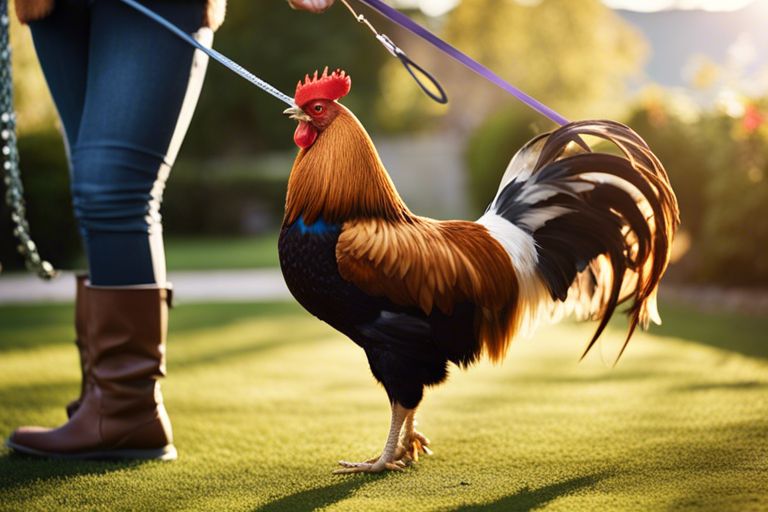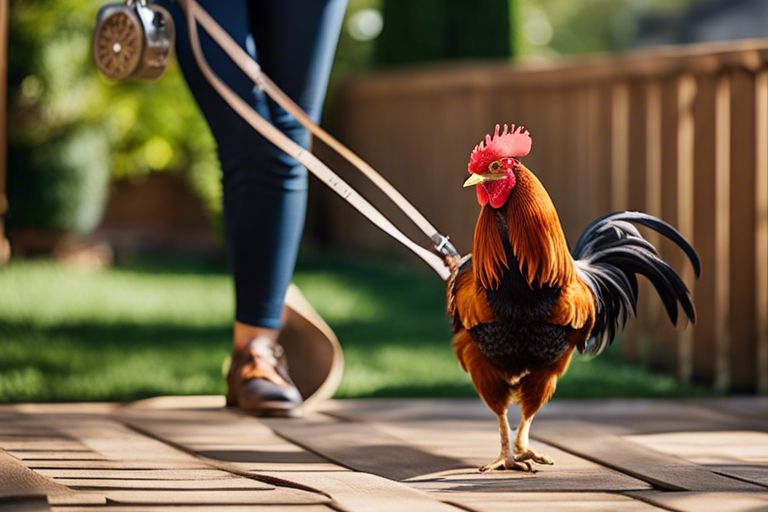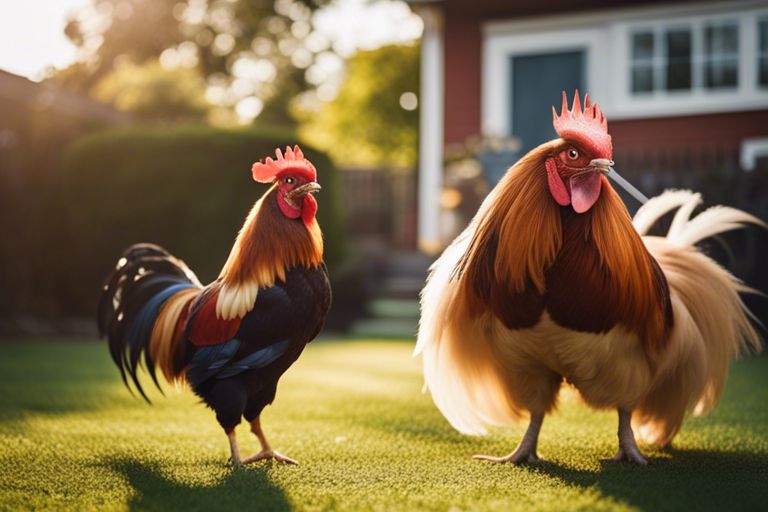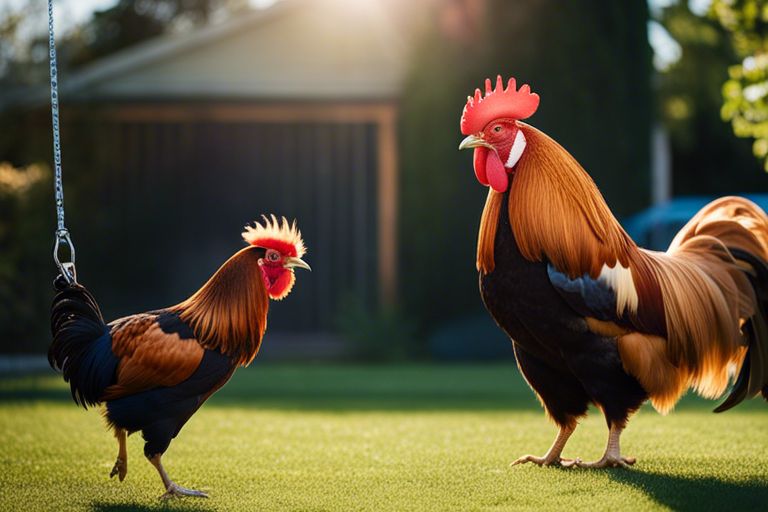There’s a certain art to training your rooster to behave in a way that is both manageable and enjoyable for you as their owner. In this list, we’ll explore into key strategies and tips that will help you build a strong relationship with your feathery friend while ensuring they follow basic behavioral guidelines. From establishing clear boundaries to using positive reinforcement, these vital tips will guide you through the process of training your rooster to be a well-behaved member of your flock.
Establish Trust Early
When training your rooster, one of the first steps you need to take is establishing trust early. Roosters are territorial and can be easily startled if they feel threatened or insecure. By building a strong foundation of trust from the beginning, you can ensure a smoother training process and a more cooperative rooster.
Be Consistent
An crucial aspect of training your rooster is to be consistent in your actions and expectations. Roosters thrive on routine and clear boundaries. By maintaining a consistent training schedule and enforcing rules consistently, you can help your rooster understand what is expected of him and reinforce positive behaviors effectively.
Show Patience
Trust is a crucial component in building a strong bond with your rooster. When training your rooster, it is important to show patience and understanding. Roosters may not learn commands or behaviors as quickly as other animals, so it is crucial to give them time to understand and respond to your training methods.
Establishing trust early on by being patient and consistent will set the tone for a successful training relationship with your rooster. Be mindful of, building trust takes time, and each rooster is unique in their learning pace and temperament. By showing patience and understanding, you can create a more harmonious and cooperative bond with your feathered friend.
Create a Routine
Regular Feeding
The key to training your rooster to behave lies in establishing a consistent routine. Start with regular feeding times to set the tone for the rest of the day.
Consistent Handling
Consistent handling is crucial in building trust between you and your rooster. Make sure to handle him gently and confidently every day.
A rooster that is used to being handled regularly will be more likely to respond positively to your training commands and be easier to manage overall. Consistent handling also helps him get accustomed to being around humans and makes him less likely to become aggressive.
Use Positive Reinforcement
Reward Good Behavior
If you want to train your rooster to behave, you need to establish a system of positive reinforcement. Some roosters respond well to treats, such as mealworms or grains, as a reward for good behavior. Use a clicker or a verbal cue like “good boy” to mark the desired behavior and then immediately follow it with a treat. This will help your rooster understand what actions you want to see more of.
Avoid Punishments
Assuming your rooster misbehaves, it’s crucial to avoid using punishment as a form of correction. Some roosters may become aggressive or fearful if they are yelled at, chased, or physically disciplined. This can undo any progress you have made in training your rooster and may even lead to behavioral issues. Instead of focusing on what you don’t want your rooster to do, redirect their behavior towards what you do want to see.
Behavioral training takes time and consistency, so be patient and persistent with your rooster. By using positive reinforcement and steering clear of punishments, you can effectively train your rooster to behave in a way that is conducive to a harmonious relationship between you and your feathered friend.

Handle with Care
Gentle Touch
To handle a rooster effectively, it is crucial to approach them with a gentle touch. Roosters can be territorial and may react aggressively if they feel threatened. When handling your rooster, be calm and gentle, using slow and deliberate movements to avoid startling them. It’s important to develop a bond of trust with your rooster through gentle handling, which will make training and interacting with them much easier in the long run.
Build Confidence
For a rooster to behave well, it is crucial to build their confidence. Roosters that are confident are less likely to exhibit aggressive behavior. To help your rooster build confidence, provide a safe and secure environment for them to roam freely. Encourage positive interactions by rewarding good behavior with treats and praise. Regular, gentle handling will also help your rooster feel more comfortable and confident around you, strengthening your bond and creating a harmonious relationship.

Minimize Stressors
Provide Safe Environment
To ensure your rooster behaves well, it is crucial to provide a safe and secure environment for them. Keep their coop clean, provide adequate shelter from harsh weather conditions, and make sure they have enough space to move around freely. Safe surroundings will help reduce anxiety and aggressive behavior in your rooster.
Reduce Loud Noises
To minimize stress on your rooster, it’s necessary to reduce loud noises in their vicinity. Roosters are sensitive to loud sounds, which can startle them and lead to aggressive reactions. Limit loud activities like machinery near their living area and try to maintain a calm and quiet environment to keep your rooster calm and well-behaved.
On the note of loud noises, roosters can get agitated by sudden sounds, such as honking car horns or banging sounds. These noises can trigger stress responses in roosters, leading to aggressive behavior or heightened anxiety levels. It’s best to keep their environment as peaceful as possible to ensure their well-being and good behavior.
Respect Rooster’s Space
Recognize Territory
Roosters are territorial birds and can become aggressive if they feel their space is being invaded. It’s important to understand and respect their territorial boundaries to avoid any confrontations. Look out for signs of aggression such as puffing up their feathers, making loud noises, or charging at you.
Allow Retreat
Clearly define areas where your rooster can retreat to when they feel threatened or overwhelmed. This can be a quiet corner of the coop or a designated roosting spot where they can have some alone time. By providing a safe retreat, you are respecting your rooster’s need for space and helping them feel secure in their environment.
Space is crucial for a rooster’s well-being and behavior. Understanding their territorial instincts and providing them with the opportunity to retreat can help maintain a harmonious relationship with your feathered friend. Recall, a happy rooster is a well-behaved rooster!

Socialize Your Rooster
Introduce New People
Your rooster’s behavior around new people can have a big impact on how he is perceived. You’ll want to introduce him to a variety of individuals to help him feel comfortable and confident in social situations. Have friends and family members interact with him regularly to ensure he becomes accustomed to different personalities and voices.
Acclimate to Animals
Roosters naturally have a territorial instinct and may become defensive around unfamiliar animals. To prevent any aggressive behavior, slowly introduce your rooster to other pets in your household. Start by allowing them to see each other from a distance and gradually decrease the separation. Monitor their interactions closely and reward positive behavior with treats to reinforce good socialization habits.
Plus, providing your rooster with regular opportunities to interact with other animals can help him develop important social skills and reduce his tendency to act out aggressively in the future.
Set Behavior Boundaries
Discourage Aggression
Even though roosters can sometimes display aggressive behavior, it is important to discourage this type of behavior early on. Aggression in roosters can be dangerous not only to other birds but also to humans. To discourage aggression, never tolerate pecking or attacking behavior. Use a firm tone and body language to show your rooster that aggressive behavior will not be accepted. Consistent discipline is key in setting boundaries for aggression.
Encourage Social Behavior
Social behavior is vital for a well-behaved rooster. Roosters are social animals that establish a pecking order within the flock. Encouraging social behavior involves providing enough space for all birds to establish their place in the hierarchy. Roosters that have healthy social interactions with other birds are less likely to exhibit aggressive behavior towards them.
Setting behavior boundaries for your rooster is crucial in maintaining a harmonious flock. By discouraging aggression and encouraging positive social behavior, you are helping your rooster understand its place within the flock hierarchy. Consistency and patience are key when establishing these boundaries, and it is important to address any behavioral issues promptly to ensure a well-behaved rooster.
Monitor Health Regularly
Check for Parasites
After bringing a rooster into your flock, it is crucial to monitor its health regularly. Some common health issues in roosters are parasites, such as mites and lice. These pests can cause irritation and discomfort to your rooster, leading to a decrease in egg production or weight loss. Therefore, it is imperative to check your rooster for any signs of parasites regularly.
Observe Eating Habits
Some roosters may experience changes in eating habits when they are unwell. Noticing these changes can help you address any health issues promptly. For instance, if your rooster suddenly shows a decrease in appetite or starts eating less than usual, it could be a sign of an underlying health problem. Monitoring your rooster’s eating habits can provide valuable insights into its overall health and well-being.
Seek Professional Advice
For any rooster training issues that you find too challenging to handle on your own, seeking professional advice is highly recommended. Professionals like avian vets and experienced animal behaviorists can provide invaluable guidance and support to address your rooster’s behavioral issues effectively.
Consult Avian Vet
You’ll want to consult an avian vet if you notice any concerning behavioral patterns in your rooster. Avian vets specialize in bird health and behavior, and they can help assess any underlying medical conditions that may be contributing to your rooster’s behavior. They can also provide you with tailored advice on how to manage and modify your rooster’s behavior in a safe and humane way.
Attend Training Workshops
With the rise in popularity of backyard chicken keeping, more training workshops specifically tailored for poultry owners are becoming available. These workshops can provide valuable insights into effective training techniques, communication methods, and behavior modification strategies for roosters. By attending these workshops, you can gain hands-on experience and learn from seasoned professionals in the field.
This extra training can empower you with the knowledge and skills needed to address a wide range of behavioral issues your rooster may exhibit. It also allows you to network with other poultry owners, exchanging tips and tricks that have worked well for them in training their roosters.
Conclusion
With these considerations in mind, training your rooster to behave can be a successful and rewarding process. By establishing yourself as the leader, using positive reinforcement techniques, and remaining consistent in your training efforts, you can encourage desirable behaviors in your rooster. Remember to be patient and understanding, as training takes time and effort. With dedication and the right approach, you can enjoy a well-behaved and happy rooster in your flock.
FAQ
Q: Why is training a rooster important?
A: Training a rooster is important to ensure good behavior, safety, and effective communication with your feathered friend.
Q: When is the best time to start training a rooster?
A: The best time to start training a rooster is when they are young chicks, as they are more receptive to learning and forming habits.
Q: What are some basic commands to teach a rooster?
A: Some basic commands to teach a rooster include “come,” “stay,” “quiet,” and “no pecking.”
Q: How can I establish dominance with my rooster?
A: To establish dominance with your rooster, use confident body language, consistent training methods, and positive reinforcement to show leadership.
Q: What are some common behavior issues in roosters?
A: Common behavior issues in roosters include aggression, excessive crowing, pecking, and territorial behavior.
Q: How can I address aggression in my rooster?
A: To address aggression in your rooster, establish yourself as the dominant leader, use a firm but gentle approach, and provide plenty of space and enrichment.
Q: What role does positive reinforcement play in rooster training?
A: Positive reinforcement is vital in rooster training as it helps strengthen desired behaviors and create a trusting bond between you and your rooster.










